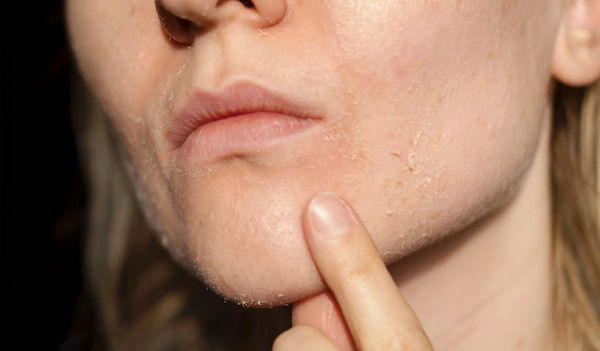The Ultimate Guide to Coping with Dry Skin: Causes, Treatments, and Prevention
Struggling with dry, flaky, or itchy skin? Discover the ultimate guide to dry skin care—learn the causes, best treatments, daily routines, and prevention tips to restore soft, hydrated, and healthy skin.

Written by Dr. Siri Nallapu
Reviewed by Dr. Rohinipriyanka Pondugula MBBS
Last updated on 13th Jan, 2026

Introduction
Does your skin often feel tight, itchy, or look flaky no matter how much lotion you use? You’re not alone. Dry skin, or xerosis, is a common condition that affects millions, especially as seasons change or we age. It’s more than just a cosmetic concern; it can be genuinely uncomfortable and even painful if left unaddressed. But coping with dry skin doesn't have to be a constant battle. This comprehensive guide is your go-to resource for understanding what causes your skin to lose moisture, how to repair your skin's natural barrier, and which daily habits and products can bring back that soft, supple feel. We’ll dive into everything from the best ingredients to look for in a moisturizer to when it might be time to consult a professional. Get ready to transform your skin from parched to perfected.
What Exactly is Dry Skin? Understanding Xerosis
Dry skin occurs when your skin doesn't retain sufficient moisture. This can happen due to external factors like cold weather or hot showers, or internal factors like genetics and diet. The medical term for abnormally dry skin is xerosis. At its core, the issue lies in a compromised skin barrier. Think of your skin's outermost layer (the stratum corneum) as a wall made of bricks (skin cells) and mortar (lipids like ceramides, cholesterol, and fatty acids). When this "mortar" is depleted, the wall becomes weak, allowing water to escape and irritants to enter, leading to that characteristic dryness, tightness, and irritation.
The Skin's Natural Moisture Barrier: A Quick Science Lesson
Your moisture barrier is your first line of defense against the world. A healthy barrier is crucial for keeping hydration locked in and keeping pollutants and allergens out. When this barrier is impaired, it leads to Trans-Epidermal Water Loss (TEWL), the scientific term for your skin’s water evaporating into the environment. Effective skincare for dry skin focuses on either adding water back into the skin (with humectants) or sealing the barrier to prevent this water loss (with occlusives and emollients).
Common Signs and Symptoms of Dry Skin
Recognizing the signs is the first step toward treatment. Symptoms can range from mild to severe:
A feeling of tightness, especially after showering or swimming.
- Skin that appears rough, dull, or ashy.
- Itching (pruritus), which is one of the most common and frustrating symptoms.
- Slight to severe flaking or scaling, which can look like fine dust or large patches.
- Redness and irritation.
- Fine lines or cracks, which can sometimes deepen and bleed, opening the door to infection.
Why is My Skin So Dry? Pinpointing the Causes
Understanding the root cause of your dry skin is key to finding the right solution. The causes are typically a mix of environmental triggers and internal biological factors.
Environmental Aggressors and Lifestyle Factors
Your daily environment plays a huge role. Key culprits include:
- Weather: Skin is typically driest in winter, when cold temperatures and low humidity levels outside, combined with dry indoor heating, rob skin of moisture. However, excessive sun exposure in summer can also dehydrate the skin.
- Hot Showers and Baths: While soothing, prolonged exposure to hot water breaks down the lipid barriers in your skin, stripping away natural oils.
- Harsh Soaps and Detergents: Many conventional soaps, detergents, and shampoos are formulated to remove oil, which can be too stripping for dry skin types.
- Chlorine: Swimming frequently in heavily chlorinated pools can have a significant drying effect.
Underlying Health Conditions and Biological Factors
Sometimes, dry skin is a symptom of something else:
- Age: As we get older, our skin naturally produces less sebum and lipids, making dry skin a common concern for those over 40.
- Skin Conditions: Eczema (atopic dermatitis) and psoriasis are chronic conditions that directly cause severe dryness, scaling, and inflammation.
- Other Medical Conditions: Diabetes, thyroid disease, and kidney disease can affect skin hydration and moisture levels.
- Genetics: Some people are simply predisposed to having drier skin.
Dehydration and Diet: Not drinking enough water or lacking essential fatty acids and vitamins (like Vitamin E and A) in your diet can manifest as dry skin. If you're concerned about nutritional deficiencies, Apollo24|7 offers convenient home collection for tests like vitamin D or HbA1c to help you get a clearer picture of your health.
Your Daily Defense: Building a Skincare Routine for Dry Skin
A consistent, gentle routine is your best weapon against dryness. It's not about using the most products, but about using the right ones correctly.
Consult a Dermatologist for Personalised Advice
The Golden Rule: Gentle Cleansing
Ditch the harsh, foaming cleansers that leave your skin feeling "squeaky clean" – that feeling means your natural oils are gone. Opt for gentle cleansers with creamy, non-foaming formulas. Look for labels that say "hydrating," "cream," or "oil-based." Syndet bars (synthetic detergent bars) are also a much milder alternative to traditional alkaline soaps.
The Power of Hydration: Moisturizers Demystified
This is the most critical step. To be effective, a moisturizer must contain a mix of key ingredients that perform different functions. Understanding these categories will help you choose the best products.
Humectants: Drawing Moisture In
Humectants are ingredients that attract water from the dermis (deeper skin layer) and the environment into the stratum corneum. They are fantastic for providing initial hydration.
- Examples: Hyaluronic Acid, Glycerin, Honey, Alpha Hydroxy Acids (AHAs).
- Pro Tip: Apply hyaluronic acid serums to damp skin to pull that water in and plump up the skin.
Emollients: Smoothing and Softening
Emollients fill in the gaps between dry skin cells, smoothing and softening the skin's surface. They essentially "waterproof" the cracks in your skin barrier.
- Examples: Ceramides, Squalane, Jojoba Oil, Shea Butter, Dimethicone.
- Pro Tip: Ceramides are a powerhouse ingredient for those with a damaged moisture barrier, as they are a fundamental component of your skin's natural "mortar."
Occlusives: Locking Moisture In
Occlusives form a protective, waterproof film on top of the skin that prevents Transepidermal Water Loss (TEWL). They are typically thick, greasy, and best used as the final step in your routine or for extremely dry patches.
- Examples: Petroleum Jelly (Vaseline), Mineral Oil, Lanolin, Beeswax.
- Pro Tip: Slugging—applying a thin layer of petroleum jelly over your moisturizer at night—is a highly effective technique for sealing in moisture while you sleep.
Don't Forget the SPF: Sun Protection for Dry Skin
Sun exposure is a major cause of skin dehydration and barrier damage. A broad-spectrum sunscreen with at least SPF 30 is non-negotiable every single day. Choose a moisturizing formula that contains hydrating ingredients to avoid further drying out your skin.
Beyond Topicals: Lifestyle Tweaks for Lasting Relief
What you do outside your bathroom matters just as much.
Hydration from the Inside Out: Diet and Water Intake
While drinking water won't directly hydrate your skin, chronic dehydration will certainly make it worse. Ensure you're drinking adequate fluids throughout the day. Furthermore, incorporate foods rich in omega-3 and omega-6 fatty acids (like salmon, walnuts, and flaxseeds) and antioxidants (berries, leafy greens) to support your skin's health from within.
Home Humidity and Bathing Habits
Humidifier: Using a cool-mist humidifier in your bedroom, especially during dry winter months, can add crucial moisture to the air and prevent your skin from drying out overnight.
Shower Smart: Limit showers to 5-10 minutes and use lukewarm, not hot, water. Pat your skin dry with a towel instead of rubbing, and apply your moisturizer immediately within 3 minutes of stepping out to lock in the moisture that's still on your skin.
Conclusion
Coping with dry skin is a multifaceted journey that involves understanding your skin's needs, both inside and out. By moving beyond just slathering on any lotion and instead adopting a strategic approach—gentle cleansing, intelligent moisturizing with the right mix of ingredients, and supportive lifestyle changes—you can effectively repair your skin's barrier and achieve lasting comfort. Remember, consistency is key. What works in the humid summer may need adjusting for the harsh winter. Listen to your skin; it will tell you what it needs. If you've built a solid routine and are still struggling with severe itching, redness, cracking, or scaling, it's important to seek professional advice. If your condition does not improve after trying these methods, book a physical visit to a dermatologist with Apollo24|7 to rule out any underlying conditions and get a personalized treatment plan. Here's to healthier, happier, and hydrated skin!
Consult a Dermatologist for Personalised Advice
Consult a Dermatologist for Personalised Advice

Dr. Sonal Jain
Dermatologist
9 Years • MBBS, MD Dermatology, Venerology & Leprosy
Kolkata
MCR SUPER SPECIALITY POLY CLINIC & PATHOLOGY, Kolkata
(25+ Patients)

Dr. Kaushiki Hajra
Dermatologist
5 Years • MBBS,MD(D V & L)
Kolkata
VDC Clinic, Kolkata
(75+ Patients)

Dr. Kaushiki Hajra
Dermatologist
5 Years • MBBS, MD Dermatology, Venerology & Leprosy
Kolkata
MCR SUPER SPECIALITY POLY CLINIC & PATHOLOGY, Kolkata

Dr. Sree Lalitha V
Dermatologist
9 Years • MBBS, DDVL , FRGUHS , Fellowship in Cosmetology. Fellowship in Dermatosugery - national skin centre ,Singapore. University medal holder in postgraduation and national scholarship in IADVL dermacon 2017
Bengaluru
Apollo Medical Center, Marathahalli, Bengaluru

Dr. Madhab Datta
Dermatologist
5 Years • MBBS, MD (DVL)
Kolkata
Dr. Madhab Datta's Clinic, Kolkata
Consult a Dermatologist for Personalised Advice

Dr. Sonal Jain
Dermatologist
9 Years • MBBS, MD Dermatology, Venerology & Leprosy
Kolkata
MCR SUPER SPECIALITY POLY CLINIC & PATHOLOGY, Kolkata
(25+ Patients)

Dr. Kaushiki Hajra
Dermatologist
5 Years • MBBS,MD(D V & L)
Kolkata
VDC Clinic, Kolkata
(75+ Patients)

Dr. Kaushiki Hajra
Dermatologist
5 Years • MBBS, MD Dermatology, Venerology & Leprosy
Kolkata
MCR SUPER SPECIALITY POLY CLINIC & PATHOLOGY, Kolkata

Dr. Sree Lalitha V
Dermatologist
9 Years • MBBS, DDVL , FRGUHS , Fellowship in Cosmetology. Fellowship in Dermatosugery - national skin centre ,Singapore. University medal holder in postgraduation and national scholarship in IADVL dermacon 2017
Bengaluru
Apollo Medical Center, Marathahalli, Bengaluru

Dr. Madhab Datta
Dermatologist
5 Years • MBBS, MD (DVL)
Kolkata
Dr. Madhab Datta's Clinic, Kolkata
More articles from Dry Skin
Frequently Asked Questions
What's the difference between dry and dehydrated skin?
Dry skin is a skin type characterized by a lack of oil (sebum). Dehydrated skin is a condition where the skin lacks water. Dehydrated skin can feel tight and look dull but may still be oily. While the treatments overlap (humectants like hyaluronic acid are great for dehydration), dry skin specifically needs replenishing oils and emollients.
Is Vaseline (petroleum jelly) a good moisturizer for dry skin?
Petroleum jelly is an excellent occlusive. It's fantastic for locking in existing moisture but does not add moisture itself. For best results, apply it over a humectant-rich moisturizer or on damp skin to seal in the water. It's one of the most effective treatments for extremely dry skin on elbows, knees, and feet.
Why is my skin so dry even when I moisturize?
This usually means your moisturizer isn't strong enough or you're not applying it correctly. You may need a heavier, ointment-based product with a higher concentration of occlusives. Also, ensure you are applying your moisturizer to damp skin immediately after washing to trap water, not just product.
Are there any home remedies for dry itchy skin?
Yes, several can be soothing. An oatmeal bath can relieve itching—grind colloidal oatmeal into a fine powder and add it to lukewarm bathwater. Pure, cold-pressed coconut oil is a natural emollient that can be applied to damp skin. Always patch test any new home remedy first.
When should I be concerned about my dry skin?
If symptoms persist beyond two weeks despite consistent home care, or if you experience severe redness, widespread inflammation, open sores from scratching, or signs of infection (oozing, yellow crust), it's crucial to consult a doctor online with Apollo24|7 for further evaluation. This could indicate eczema, psoriasis, or another medical condition.

